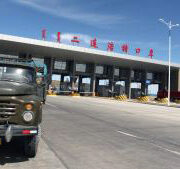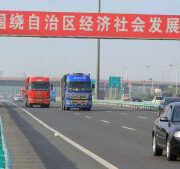Tag Archives | economic growth
Economics
 Economics, Poverty
Economics, Poverty
 Industry and trade, Urban development
Industry and trade, Urban development
 Industry and trade
Industry and trade
 Industry and trade, Regional cooperation and integration
Industry and trade, Regional cooperation and integration
 Economics
Economics
 Finance sector development
Finance sector development

Moving beyond GDP: Well-being and degrowth development alternatives

The financial crisis of 2008 sent shock waves across the world as economies collapsed or were severely damaged or crippled. Since then, many other crises have ensued, covering issues including debt, finance, stock markets, the environment, natural disasters, society, social media, governance institutions, politics, the nation state, and, most recently, global health pandemics. In a rapidly changing world, the number and frequency of global crises have not slowed or decreased. Rather, such crises are mounting, accelerating, and recurring.
Structural transformation, growth, and inequality: Evidence from Viet Nam

Economic development and growth entail large-scale structural transformation of economies. Many Asian and African economies are now undergoing such structural transformation—typically from agriculture to manufacturing and service sectors. This transformation inevitably involves reallocation of workers from the primary sector to the manufacturing and service sectors. One of the important questions arising is whether such growth led by structural transformation helps the poor. On the one hand, growth may lift people out of poverty and therefore improve living standards for everyone. On the other hand, growth may increase income inequality by benefiting the rich more than the poor.
High-speed rail investment: A butterfly effect for urban chaos

In 1969, Professor Edward Norton Lorenz coined the term “butterfly effect” to state that subtle changes in conditions can influence or cause seemingly unrelated results elsewhere. The flutter of a butterfly’s wings at place A can eventually develop into a hurricane at place B even though A and B are not related. Almost two decades after the term was coined, Japan National Railways (JNR) was privatized and split into several corporations, and now JR East manages the largest network of railway lines in Japan.
Dismissal laws, innovation, and economic growth

The appropriate degree of government intervention in private contractual relationships, particularly in employment law, remains a fraught public policy issue. In arguing the detrimental effects of laws that prevent employers from terminating labor contracts with employees, flexible labor market conditions in the United States (US)—exemplified by the common-law “employment-at-will” doctrine—are often contrasted with the rigidities engendered by employment protection provisions in several European countries.
TPP and RCEP – friends not foes

Talks just concluded in Auckland, New Zealand on Saturday show that plans for the Regional Comprehensive Economic Partnership (RCEP) are advancing. Just as both Hillary Clinton and Donald Trump, the next potential leaders of the Trans-Pacific Partnership’s (TPP) biggest partner—the US—have distanced themselves from the agreement. Some even suggest that the US Congress won’t ratify the TPP agreement, and warn that the world economy risks US isolationism.
Structural reforms to sustain Asia’s growth

Economic growth in both developing and advanced economies has slowed since the global financial crisis. Developing Asia’s growth also moderated after the crisis, to a large extent driven by the slowdown in the People’s Republic of China (PRC). The region’s economy expanded on average 7.6% annually during 2001–2010, but growth slowed to an annual average of 6.5% during 2011–2015. ADB is projecting further deceleration to 5.7% in each 2016 and 2017.
Why do we need financial education in Asia?

This article assesses the case for promoting financial education in Asia. It argues that the benefits of investing in financial education can be substantial. Data are limited, but indicate low financial literacy scores for selected Asian countries. As economies develop, access to financial products and services will increase, but households and small and medium-sized enterprises (SMEs) need to be able to use the products and services wisely and effectively. More effective management of savings and investment can contribute to overall economic growth. Moreover, as societies age and fiscal resources become stretched, households will become increasingly responsible for their own retirement planning. Asia’s evolving experience suggests that more national surveys of financial literacy are needed and that coherent, tailored national strategies for financial education are essential for success.


Search
Subscribe / Connect to Asia Pathways
Subjects
- Accelerating Progress in Gender Equality
- Addressing Remaining Poverty and Reducing Inequality
- Agriculture and natural resources
- Capacity development
- Climate change
- Economics
- Education
- Energy
- Environment
- Finance and Innovation
- Finance sector development
- Gender
- Globalization and Economic Stability
- Governance and public sector management
- Health
- Industry and trade
- Information and Communications Technology
- Infrastructure
- Making Cities More Livable
- Miscellaneous
- Population
- Poverty
- Private sector development
- Regional cooperation and integration
- Sanitation
- Social development and protection
- Strengthening Governance and Institutional Capacity
- Subjects
- Transport
- Uncategorized
- Urban development
- Video Blog
- Water
Recent Posts
- From Crisis to Resilience: The Evolution of the Banking Sector in Asia and the Pacific
- Tariffs on the Table: What Could Be Asia’s Next Move?
- Investing in Childcare a Win for Women and the Economy
- Flush and Flourish: Upgraded Toilets Can Transform Lives in Rural Asia
- New Ways for Climate Finance and Development in Asia and the Pacific




Recent Comments